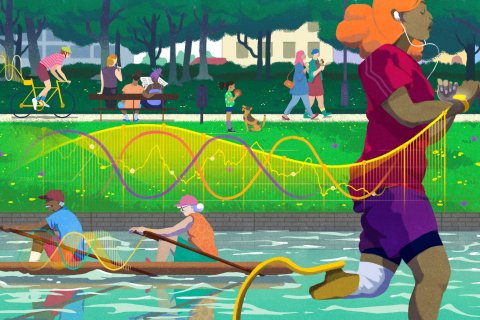About the AI Lab for Healthy Living

Living a healthy life is shaped by numerous aspects of our Living Environment, including the built environment (e.g., walkability), the natural environment (e.g., green spaces), the social environment (e.g., social networks and income), and the physiochemical environment (e.g., air pollution), as well as different personal aspects including, person-level characteristics (e.g., genetic predisposition) and lifestyle (e.g., food and exercise).
AI research can contribute to healthy living by providing an ethical and privacy-aware way to measure, model, predict, and guide how to effectively change factors of the Living Environment that impact individual and community health. The Utrecht AI & Healthy Living Lab collaborates with a variety of stakeholders and organizations on the development and application of innovative AI techniques to help address the challenges of healthy living related to the Living Environment.
Providing adequate healthcare is a costly and complex task, including many stakeholders, from policymakers and insurance companies via healthcare professionals and social service providers to the everyday decisions of individuals. Improved access to and understanding of data can support optimization of the required healthcare resources and more personalized care. Understanding a neighborhood's characteristics in space-time may help identify its critical risks and most effective local policies. Similarly, integrating the needs and daily life contexts of an individual can help health professionals predict the patient's risks and provide more appropriate prevention or treatment plans. Finally, health technology companies can empower users by informing and guiding their health behavior.
Artificial Intelligence will make an essential contribution to these developments. There are substantial challenges related to reliably and efficiently gathering data, providing fair and ethical risk prediction models on both individual and community levels, choosing the most beneficial interventions to reduce such risks, and estimating future costs for individuals or healthcare capacity requirements in a whole community. In the lab, we are specialized in data-driven techniques capturing the Living Environment, human-centered AI prediction models based on Living Environment data, and Living Environment-linked interventions through adaptive and interactive systems. We favor multidisciplinary projects, combining computing science expertise with medical sciences, urban geography and planning, policy, and social and behavioral sciences.

